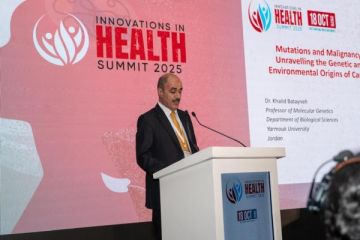اخبار الاردن
موقع كل يوم -الوقائع الإخبارية
نشر بتاريخ: ١٣ تشرين الثاني ٢٠٢٥
Al_wakaai news: Professor Khalid Al-Batayneh, Professor of Molecular Genetics at Yarmouk University, affirmed that most cancers result from genetic mutations that disrupt normal control over cell division, making them difficult to regulate. He explained that acquired genetic mutations account for 29% of all mutations, and it is these mutations that healthcare systems and scientific research aim to prevent by reducing exposure to environmental factors that trigger them, ultimately saving millions of lives.
Cancer-causing genetic mutations are divided into two types. The first are hereditary mutations, which are passed down from parents and increase susceptibility to the disease, such as BRCA mutations associated with breast cancer. The second are acquired mutations, which develop during an individual's lifetime due to exposure to environmental factors such as smoking, radiation, chronic infections, unhealthy diets, or physical inactivity.
In an interview with Ammon News on the sidelines of the Healthcare Future Summit 2025 in Dubai, Al-Batayneh highlighted that obesity rates in Jordan are alarmingly high, with nearly half of women (44.3%) classified as obese or overweight. He clarified that while obesity does not alter the DNA sequence itself, it influences how genes function through epigenetic changes; chemical modifications that regulate gene activity.
Al-Batayneh noted that the risk of disease increases in direct proportion to exposure to harmful substances. The higher the exposure, the greater the risk, and vice versa. The levels of toxic and carcinogenic substances produced when heating tobacco or vaping e-liquids are significantly lower than those in traditional cigarette smoke. This means exposure to toxins such as carbon monoxide, acrolein, and formaldehyde is reduced.
He further explained that the toxic substances produced during cigarette combustion, including nitrosamines and aromatic hydrocarbons, can cause mutations such as substitutions, deletions, or duplications in DNA. These mutations may disrupt genes that regulate cell growth, like the tumor suppressor gene P53, thereby increasing the risk of cancer. In contrast, nicotine pouches, which are tobacco-free, contain much lower levels of toxic substances than cigarette smoke.
Al-Batayneh emphasized that the best course of action for any smoker is complete cessation. Despite decades of efforts to encourage quitting and discourage smoking initiation, results remain limited, with only minimal declines in smoking rates. This indicates that a large segment of the population continues the habit despite being aware of the risks. For this reason, he stressed the need for intervention through less harmful, scientifically supported alternatives, such as heated tobacco products or nicotine pouches, to reduce the significant health damage among those who continue to smoke.
Addressing the types and causes of genetic mutations, Al-Batayneh noted that mutations in the Arab world are diverse and complex, resulting from a combination of genetic and environmental factors. They vary across individuals and tissues and include mutations in DNA repair genes, oncogenes, and tumor suppressor genes, often caused by oxidative stress, pollution, unhealthy lifestyles, and subtle genetic influences.
Obesity and Its Effect on Genetic Changes
Al-Batayneh explained that obesity alters how genes are activated or suppressed, particularly those linked to appetite, metabolism, and fat storage. He added that research suggests maternal obesity during pregnancy can affect gene expression in the fetus, potentially increasing the child’s risk of obesity later in life. These effects occur not through genetic mutations but through inherited epigenetic modifications that influence gene function.
'The good news is that epigenetic changes are reversible,” Al-Batayneh highlighted. Adopting a healthy lifestyle, including balanced nutrition, regular physical activity, and sufficient sleep, can restore normal gene activity and minimize obesity’s impact. For individuals who struggle to make these changes, he recommended consulting endocrinologists, who may prescribe modern injectable medications proven to aid in weight loss and reduce risks such as heart disease, despite some associated side effects.
A Message to the Scientific and Medical Community in Jordan and the Region
In his closing remarks, Al-Batayneh addressed the scientific and medical community in Jordan and the Arab world, calling for a realistic, evidence-based approach that embraces the principle of harm reduction. He urged doctors, scientists, and researchers to review and rely on credible, peer-reviewed studies.
'I am a researcher in the field of science. My role is to review published studies, conduct research, and draw conclusions from evidence. My message is simple: rely on proof, and do not believe information that is not grounded in scientific principles,” he said.
Al-Batayneh encouraged constructive and open scientific dialogue, continued awareness about the dangers of smoking, and comprehensive efforts to help people quit or, when quitting is not possible, move toward less harmful alternatives. This, he stressed, is key to maintaining a balanced, effective, and sustainable approach to prevention, treatment, and harm reduction in public health.






















































